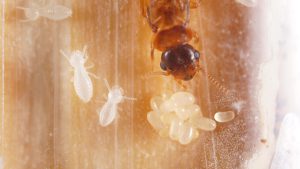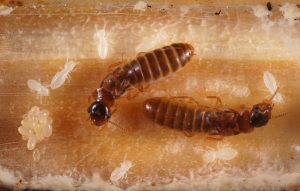
Studying the parental behaviors of termites has provided a University of Florida scientist with a rare look into how a queen and king pair push the limits of parenthood.
The result is a look at how the queen and king work the hardest as parents during the early life of the colony, to ensure that their first offspring makes it, and so that they can then retire from parental duties.
Thomas Chouvenc, an assistant professor of entomology at the UF/IFAS Fort Lauderdale Research and Education Center, has published a new research in the journal of Functional Ecology of the British Ecological Society. The study sheds light on an altruistic parental behavior in a destructive pest that is partially responsible for the $40 billion a year in termite damage to structures around the world.
“Scientists often think of termites as these complex societies, where the workers are taking care of everyone, including the queen and king,” said Chouvenc. “This is true in developed colonies, but during colony establishment, the new queen and king are the most remarkable parents.”
Termites start a colony with two winged termites, which flew out of their initial colony, explained Chouvenc. Once they find each other, they drop their wings and isolate themselves to mate and start a new colony, he said.
In termites, a new colony is under “biparental” care, where a new queen and king, who are both in charge of everything. As workers emerge, the colony shifts to “alloparental” care, where the role shifts to older offspring to provide care for younger siblings.
For the study, Chouvenc used 450 subterranean termite colonies (Coptotermes) in the beginning stages of establishment. Chouvenc examined the timing of physiological changes in the queen and king during the transition from biparental to alloparent care.
In the study, Chouvenc’s findings show that king and queen pairs take relentless care of their first brood to the point where the parents are nearly exhausted. The queen and king later shift the responsibilities to their first offspring once the children exhibit readiness, as functional workers.

This shift allows the queen and king to abandon all care duties, and focus on reproduction only, increasing worker production, resulting in remarkable colony growth.
“During this critical period, most wannabe queens and kings fail to establish and die,” he said. “These winged termites leave their nest with limited resources and have a one-shot attempt to start a new colony. The queen and king form a life-long monogamous relationship and must rear the first few offspring on their own.”
The study also shows that the parental duties of this pair only last for a few months, explained Chouvenc. Once the first few workers are produced, the queen and king become fully dependent on them and stop caring for the newly laid eggs.
“In a way, termite royals start as the most dedicated parents, but once their first kids can take care of the next batch of eggs, they forever retire from this duty, and only focus on producing more eggs, while the colony grows further under the care of a growing worker force” he said.
“This study highlights the importance of parental care in the emergence of insect societies and future comparative studies among other termites and ants may reveal how such societies became dominant ecosystem engineers, over millions of years of evolution,” Chouvenc said.
###
By Lourdes Mederos, rodriguezl@ufl.edu
ABOUT UF/IFAS
The mission of the University of Florida Institute of Food and Agricultural Sciences (UF/IFAS) is to develop knowledge relevant to agricultural, human and natural resources and to make that knowledge available to sustain and enhance the quality of human life. With more than a dozen research facilities, 67 county Extension offices, and award-winning students and faculty in the UF College of Agricultural and Life Sciences, UF/IFAS brings science-based solutions to the state’s agricultural and natural resources industries, and all Florida residents.
 2
2
